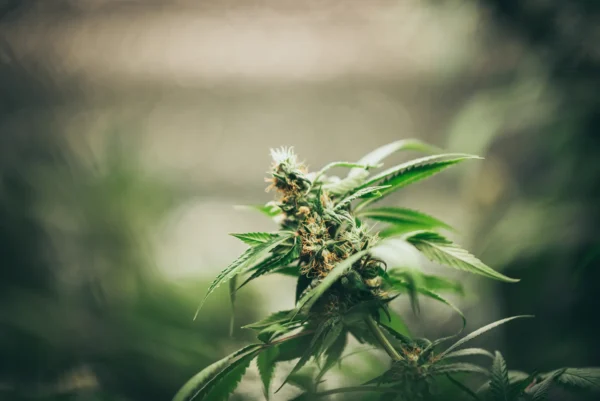Dying Matters Awareness Week encourages open conversations about end-of-life care, helping to break the stigma around death and dying. This year’s discussions feel particularly timely, as the UK’s Terminally Ill Adults (End of Life) Bill moves forward[1]. If passed, the bill could change the future of palliative care by legalising assisted dying.
With as many as 90% of people at the end of life benefiting from palliative care, finding effective and varied ways to manage symptoms is crucial[2]. Medical cannabis is emerging as a potential option for patients who experience pain, nausea, and anxiety. While research is still ongoing, there is excitement about the use of medical cannabis in those with reduced quality of life due to illness, making it an area worth exploring.
What is Dying Matters Awareness Week?
Taking place from 5th to 11th May 2025, Dying Matters Awareness Week is an annual event that encourages people to talk about death and dying[3]. Ope§ning up these conversations helps individuals, families, and communities feel more comfortable discussing end-of-life care.
Each year, organisations across the UK host events, workshops, and discussions, creating supportive spaces where people can share their experiences and learn from others. This year’s theme, The Culture of Dying Matters, explores how different communities approach death and dying. While beliefs and traditions vary, the emotions of grief, loss, and remembrance are universal.
This focus aims to highlight what unites us in these experiences and encourage more open conversations about the realities of end-of-life care.
What is Palliative Care?
Palliative care is guided by a principle to improve the comfort and wellbeing of people with life-limiting illnesses. It takes a holistic approach, addressing physical, psychological, social, and spiritual needs – not just medical symptoms[4]. This care can be provided alongside treatments aimed at controlling illness or associated side effects, ensuring patients feel supported at every stage. Common treatments in palliative care aim to support with pain, fatigue, breathlessness, nausea and vomiting, loss of appetite, anxiety, and sleep issues[5]. The goal is to maintain quality of life, allowing patients to feel as comfortable and in control as possible[6].
There isn’t a one-size-fits-all approach to palliative care, which is why there is growing interest in how medical cannabis could support some of these patients.
Medical Cannabis in Palliative Care
Medical cannabis can now be explored for several common symptoms in palliative care, including pain, nausea, and anxiety. While clinical trials are limited, early studies and patient reports suggest medical cannabis may be appropriate when other treatments fall short[7].
Potential Benefits of Medical Cannabis
Patient-reported outcomes from the UK Medical Cannabis Registry indicate improvements in mobility, pain, discomfort, and anxiety[8]. However, more research is needed to fully understand the impact of medical cannabis on palliative care patients specifically.
Early studies have suggested that medical cannabis may influence:
- Pain: Some studies suggest that medical cannabis may be suitable for individuals who experience chronic or cancer pain[9].
- Nausea and vomiting: Cannabis has been used to ease chemotherapy-related nausea, and research is seeking to understand its role in other causes of nausea and vomiting.
- Anxiety and mood: In patients with anxiety and mood disorders, there is emerging evidence about the effects of medical cannabis. Consequently, there is growing interest in the use of medical cannabis in patients who experience these issues at the end of life.
Medical cannabis also offers an alternative to traditional medications, which is of interest for patients who experience intolerable side effects from opioids and other drugs[10].
Challenges and Considerations
Although progress has been made for patients since the 2018 change in legislation, integrating medical cannabis into palliative care isn’t straightforward. There are several challenges, including:
- Limited clinical research: A lack of large-scale studies makes it difficult to establish clear guidelines for use.
- Healthcare provider knowledge: Many doctors receive little training on cannabinoid treatments, making prescribing and monitoring more complex.
- Regulatory barriers: While medical cannabis is legal in the UK, access remains limited, and policies on its use in palliative care settings vary.
Private healthcare costs: Medical cannabis is rarely prescribed on the NHS, meaning many patients need to go to a private clinic and pay for appointments and medicine. It’s also important to consider potential side effects and drug interactions. Medical cannabis can affect cognition, coordination, and mental health, and it may interact with other medications, such as opioids and certain cancer treatments.
Talking about end-of-life care is never easy, but it’s essential for making informed choices. Dying Matters Awareness Week provides an opportunity to explore all available options, including medical cannabis where appropriate, to ensure the best possible care for those facing a terminal illness.
By adding to the conversation, we hope to help break the stigma around death and dying, giving patients and their loved ones the knowledge and confidence to make care decisions that best support their complex needs.
- [1] BBC News (2024). What’s the difference between assisted suicide and euthanasia? BBC News. [online] 29 Nov. Available at: https://www.bbc.co.uk/news/uk-47158287.
- [2] Hospice Uk (2024). Key facts about hospice care. [online] Hospice UK. Available at: https://www.hospiceuk.org/about-us/key-facts-about-hospice-care.
- [3] Hospice UK. (2023). Dying Matters Awareness Week. [online] Available at: https://www.hospiceuk.org/our-campaigns/dying-matters/dying-matters-awareness-week.
- [4] NHS (2022). End of Life Care. [online] NHS. Available at: https://www.nhs.uk/conditions/end-of-life-care/what-it-involves-and-when-it-starts/.
- [5] Center to Advance Palliative Care (2019). What Is Palliative Care? [online] Get Palliative Care. Available at: https://getpalliativecare.org/whatis/.
- [6] Marie Curie (2022). What is palliative care? [online] Marie Curie. Available at: https://www.mariecurie.org.uk/information/getting-care/palliative-care.
- [7] Troyer, J. and Tanco, K. (2024). Review of the Use of Medicinal Cannabis Products in Palliative Care. Cancers, 16(7), pp.1412–1412. doi:https://doi.org/10.3390/cancers16071412.
- [8] Nimalan, D., Kawka, M., Erridge, S., Ergisi, M., Harris, M., Salazar, O., Ali, R., Loupasaki, K., Holvey, C., Coomber, R., Platt, M., Rucker, J.J., Khan, S. and Sodergren, M.H. (2022). UK Medical Cannabis Registry palliative care patients cohort: initial experience and outcomes. Journal of Cannabis Research, 4(1). doi:https://doi.org/10.1186/s42238-021-00114-9.
- [9] Madhur Varadpande, Erridge, S., Aggarwal, A., Cowley, I., Evans, L., Clarke, E., McLachlan, K., Coomber, R., Rucker, J.J., Platt, M.W., Khan, S. and Sodergren, M. (2025). UK Medical Cannabis Registry: An Analysis of Clinical Outcomes of Medicinal Cannabis Therapy for Cancer Pain. Journal of Pain & Palliative Care Pharmacotherapy, pp.1–21. doi:https://doi.org/10.1080/15360288.2025.2457101.
- [10] Cyr, C., Arboleda, M.F., Aggarwal, S.K., Balneaves, L.G., Daeninck, P., Néron, A., Prosk, E. and Vigano, A. (2018). Cannabis in palliative care: current challenges and practical recommendations. Annals of Palliative Medicine, [online] 7(4), pp.463–477. doi:https://doi.org/10.21037/apm.2018.06.04.





